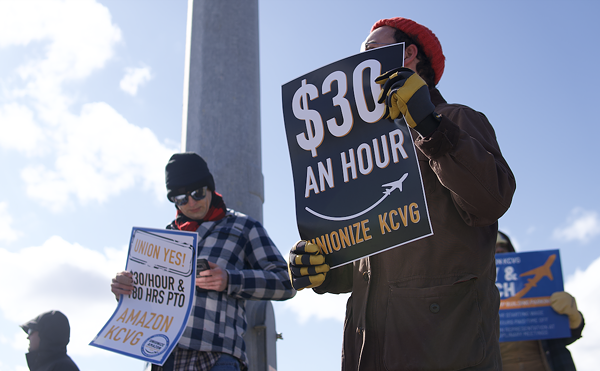|
Predatory lending can take many forms: check-cashing outlets; "Buy here, pay here" car dealers; and rent-to-own stores — each of which offer a service at a high interest rate.
But among the most pernicious money-lending trends is mortgages that end up costing families their homes. The Legal Aid Society of Cincinnati has seen the effects:
· A Lincoln Heights couple in their 70s who owned a home appraised at $55,000 got a small home equity loan through a mortgage broker. Six months later they refinanced the loan through a Florida company, then a little later received a $12,000 home repair loan at 1 percent interest from Hamilton County Community Development Department.
When the Florida company again refinanced the mortgage, the 1 percent loan became a loan with an interest rate higher than 11 percent. The following year another company refinanced the loan. Each new transaction gave a broker thousands of dollars in fees, while the couple received a few thousand in cash — which they used to pay mounting bills.
· A West End woman in her early 70s inherited a home from her parents' estate in the 1990s. She took two loans on the house, appraised at $45,000, to get a few thousand dollars in cash for repairs. She paid half the $4,800 wanted by a contractor, who arranged through a broker to finance the rest.
But the broker refinanced the whole house, earning thousands in fees, increasing the woman's debt to $51,500 and increasing her interest rate to 11.45 percent, with a 15-year balloon payment.
The woman used the $2,000 from the last refinancing to pay her higher monthly loan payments.
"Unless we're successful in helping her, she'll lose her house," says Legal Aid attorney Noel Morgan.
· A young couple with one child and another on the way fell into a scam called "house flipping." When they answered a classified ad for an apartment, a landlord showed them several places, including a few houses. He said they could own one, no matter their credit. The man lined up the financial people needed to close the loan on a Clifton Heights home and ushered them through the sale. To boost their credit, the landlord made up a job history for the wife.
The couple didn't have the house inspected. The house had been cosmetically improved with a drop ceiling and other surface repairs. A month after the closing on the sale, the plumbing backed up and the roof began leaking, among other problems. With Legal Aid's help, the coupled settled a lawsuit. Three years after they bought the house, it sits empty.
'Toxic loans'
More Americans than ever before own homes — 67.1 percent in early 2000 — but the boom included collateral damage.
Across the nation, tragic stories have emerged from what might seem a positive development, making home mortgages available to people of all incomes. Slick salesmen, including unscrupulous mortgage brokers, are using the expanding pool of available credit to line their pockets with undisclosed fees and other hidden expenses.
The loans are often marketed as a way to get cash for home repairs or consolidate credit card debt, but some of the loans deliver more debt than borrowers can repay — instead of the financial salvation brokers promise.
Salesmen phone, knock on doors and even visit churches to market loans to the elderly, poor and undereducated, often leading them into foreclosure and/or bankruptcy.
Borrowers should beware loan sharks, according to Suzanne Merusi, education program director for the Better Housing League.
"They're highly trained on how to get people to sign documents," Merusi says. "This is ruining neighborhoods."
What seems a favor — loans for people in need of cash — can prove to be a trap, according to Chip Bromley, director of Metro Strategies Group, a non-profit statewide fair housing group in Cleveland.
"They're not really providing home credit to people," Bromley says. "They're providing toxic loans."
Decades ago banks concentrated on the low-risk loans in the "primary" lowest-interest market, according to George Gummer, executive vice president of the Ohio Mortgage Bankers Association.
But banks have grown larger by merging and buying each other. With more money available to lend, banks now package a wide variety of loans and sell them to investors as an option with higher risk — and potentially higher return.
This has fueled a boom in the higher-interest "secondary" or "sub-prime" loan market — loans offered to clients with less collateral, less income or poorer credit ratings.
From 1995 to 1999, the number of refinanced loans in Ohio's sub-prime market increased by 541 p1ercent, from 11,766 to 63,609. At the same time, prime loans increased by 300 percent, according to Rick Taylor, housing policy director of the Coalition on Homelessness and Housing in Ohio (COHHIO).
"The sub-prime lending in this state has been going through the roof," Taylor says.
The same is true nationwide. Sub-prime loans increased from $39 billion in 1994 to $160 billion in 1999, according to a June 2000 report by the U.S. Department of Housing and Urban Development (HUD) and the U.S. Treasury Department.
This new wave of credit brought with it a spike in the number of foreclosures: They've nearly tripled in Hamilton County in the past five years, from 738 in 1995 to 2,111 in 2000, according to the Hamilton County Court of Common Pleas. Foreclosures have more than doubled in Ohio, from about 16,000 in 1995 to nearly 37,000 in 1999, according to the Ohio Supreme Court.
Is there a relationship between more foreclosures and predatory loans?
"In and of itself, it should open some eyes to say, 'What's going on?' " Taylor says.
An April 2000 HUD report revealed racial discrepancies in the sub-prime market. Sub-prime loans are five times more likely in black neighborhoods than white ones. Even high-income black neighborhoods were more than twice as likely as low-income white neighborhoods to receive sub-prime loans.
Policing the market
Until recently, all a broker needed to operate in Ohio was a short state application and a $25,000 bond. Recently the Ohio Senate unanimously passed new regulations requiring licensing not only of mortgage brokers, but also loan officers who work for them. Ohio has about 1,200 licensed brokers, but each broker might have 70 or more loan officers.
The bill would require brokers and loan officers to take regular training, submit a $50,000 bond and specify in writing the details of their loan agreement. People convicted of theft or money-related crimes would be denied licenses.
Under Senate Bill 76, anyone acting as a broker without a license could get up to 12 months in jail and a $2,500 fine. Anyone receiving kickbacks from third parties, such as contractors, would face up to 18 months in jail and a $5,000 fine. Loan officers operating without a license would get up to six months in jail and a $1,000 fine.
The bill is less than perfect, according to Morgan. For example, he asks, are banks a third party or not? Some offer "yield spread premiums" — bonuses of $1,000 or more to brokers who get borrowers to sign up for a higher interest rate. Would that be legal under the proposed law?
"At best, it's ambiguous," Morgan says.
Taylor says tighter regulations are needed.
"This in and of itself is not an answer," he says.
COHHIO and others pushed for limiting broker fees to six to eight percent of a loan's amount, including other costs. But that provision is not in the bill.
Taylor says there is some support in the legislature for predatory-lending restrictions similar to a 1999 North Carolina law.
"I think its major effect is to prevent the very high-cost loans from being available in this state," says Philip Lehman, a North Carolina assistant attorney general. Among the law's provisions are a prohibition of balloon payments, a series of payments that only cover a loan's interest; and a requirement that lenders and brokers show refinancing really benefits the borrower.
These rules, Lehman says, don't eliminate the sub-prime market.
"There's plenty of margin for profit," he says
But Donald Baird, a consultant and lobbyist for the Ohio Mortgage Brokers Association, says some banks and loan companies have cut back the range of loans they provide in North Carolina by up to 30 percent. Lehman, however, says the loans not being offered in North Carolina are the kind residents don't need.
A predatory-lending ordinance for the city of Cincinnati, drafted after public hearings last fall, could reach city council in the next few weeks, according to Peg Moertl, director of the Department of Neighborhood Services. Moertl declines to discuss the details of the proposal.
Other cities, such as Philadelphia, have passed laws severing city ties to banks that make predatory loans. Baird predicts a boomerang effect from this kind of legislation: The same people backing price caps and other restrictions will ask why banks and brokers aren't serving part of the population.
Already about half of the country's banks refuse to deal with unlicensed loan officers, Baird says. Companies that keep permitting bad deals will eventually go out of business, he says.
"I think the market tends to police itself," Baird says.
Fair housing advocates are skeptical and say regulation is necessary.
"It's just a way of regulating the thieves," Bromley says. ©





